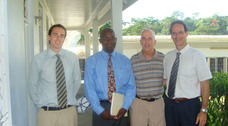2009-11-26

It’s a rare privilege to be invited to another country to help improve its mental health services. So when McGill 3rd-year medical student Anton Parker received an invitation to go to the Caribbean island of Dominica, he agreed on the spot.
He’s glad he did. “When the invitation came from Marc Laporta, MD, the Assistant Director of the Douglas-based WHO/ PAHO Collaborating Centre on Research and Training in Mental Health, I knew it was a special opportunity. He explained that he was preparing to travel to Dominica with a mandate to assist Dominican officials in writing the country’s mental health policy and plan—a project funded in part by Health Canada. He had also asked for the assistance of his colleague, Ian Bradley, PhD, from McGill’s Department of Psychology and was willing to include a student who would help with the project and gain experience.”
This journey would be the WHO/PAHO’s third trip to Dominica since 1995. The mental health concerns would be quite different from those in Montreal. “Dominica has only one psychiatrist, Griffin Benjamin, MD, who serves both the local population and, infrequently, the residents of the nearby island of Montserrat. Within Dominica, he has been working diligently to improve public awareness of the broad spectrum of mental health issues through radio, TV, and a national awareness week.
“In Dominica, stigma is a major concern—both in society in general and within the healthcare field. In a country of 70,000, with a capital city of 15,000, most people know each other, at least by face. This is a double-edged sword. On one hand, privacy is limited. On the other hand, it makes it easier to build widespread social support for dispelling stigma. Currently, mental health issues are often associated with acute psychosis and institutionalization. Therefore, individuals and their families do not want to be associated with mental health problems.”
During their one-week fact-finding mission, the team met with government representatives, including Dominica’s General Secretary of Health and Minister of Youth Affairs. They also conducted a series of focus groups with cross-sections of Dominica’s society, including mental health patients, “at risk” individuals, caregivers, health practitioners, and community organizers.
By the trip’s end, the Canadian and Dominican teams had a better understanding of current barriers to mental healthcare access, how to develop innovative ways to identify problems and intervene earlier, and how to proceed, given the realities on the ground. This trip served as the most recent step in the collaboration between the Montreal WHO/PAHO Collaborating Centre and the government of Dominica to help develop a long-term vision for mental health, a policy and an action plan to operate the recommended changes.
As for Anton, he saw the trip as a “crash course” in community psychiatry. “This whirlwind journey reinforced my passion for cross-cultural medicine and global health. When I graduated from college, I was intrigued with the idea of working with organizations such as the United States Peace Corps and in the emerging field of microfinance. However, I came to the conclusion that I would be better equipped and fulfilled if I had a skill-set to offer, in addition to my energy and enthusiasm. Within the realm of medicine, and within the smaller realm of mental health, I was able to participate with our team on a project that may indeed help better ensure the rights, and access to care, of some of the more vulnerable individuals in Dominica’s society. This is exactly the kind of project I had hoped to be involved in when I first decided to go back to school and pursue medicine.”


